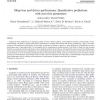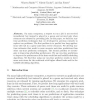1148 search results - page 4 / 230 » Improving CC-NUMA Performance Using Instruction-Based Predic... |
COGSR
2011
14 years 8 months ago
2011
Fatigue has been implicated in an alarming number of motor vehicle accidents, costing billions of dollars and thousands of lives. Unfortunately, the ability to predict performance...
136
Voted
ICSE
2012
IEEE-ACM
13 years 3 months ago
2012
IEEE-ACM
Abstract—Customizable programs and program families provide user-selectable features to allow users to tailor a program to an application scenario. Knowing in advance which featu...
115
Voted
IPPS
1999
IEEE
15 years 5 months ago
1999
IEEE
On many computers, a request to run a job is not serviced immediately but instead is placed in a queue and serviced only when resources are released by preceding jobs. In this pape...
108
Voted
OOPSLA
2005
Springer
15 years 6 months ago
2005
Springer
Currently, the most adopted criterion to invoke garbage collection is heap space exhaustion. In other words, garbage collection is invoked when the heap space (either the entire s...
118
Voted
PLDI
1995
ACM
15 years 4 months ago
1995
ACM
Traditional list schedulers order instructions based on an optimistic estimate of the load latency imposed by the hardware and therefore cannot respond to variations in memory lat...


